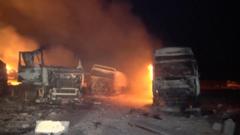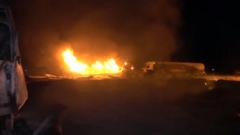The latest U.S. airstrikes targeting the Houthi militia in Yemen have resulted in significant casualties, highlighting the complexities of the ongoing conflict and raising alarms over the humanitarian situation in the region.
# Escalation in Yemen: U.S. Strikes Kill Dozens of Houthi Fighters Amid Ongoing Conflict

# Escalation in Yemen: U.S. Strikes Kill Dozens of Houthi Fighters Amid Ongoing Conflict
President Trump's administration intensifies military actions against Houthi rebels in Yemen, fueling humanitarian concerns.
In a fresh round of U.S. airstrikes, launched on Thursday night, dozens of people were reported killed in the port city of Ras Isa in Yemen's northwest. The American strikes, part of an intensified campaign by President Trump's administration against the Iran-backed Houthi militia, were aimed at countering the militia's recent attacks on commercial vessels in the Red Sea and drone assaults targeting Israel.
According to Houthi officials, at least 38 individuals died, and more than 100 were injured. This claim has yet to be independently verified, yet it underscores the dire state of security and well-being in the region. The strikes have mostly targeted Ras Isa, seen as a strategic fuel depot within the Houthi-controlled province of Hudaydah.
President Trump, echoing his predecessor's approach, has vowed to "completely annihilate" the Houthi forces but has faced criticism regarding the efficacy of such military actions. Despite the escalations, the Houthis have remained adamant and indicated a readiness for further conflict with the U.S., stating that they would welcome a war with what they term their "declared enemy."
Experts have expressed concern that these bombings could exacerbate the already critical humanitarian crisis in Yemen. The United Nations has called the situation in Yemen the world's largest humanitarian emergency, with approximately 80% of the population requiring urgent assistance. The targeting of vital infrastructure like ports may disrupt essential aid delivery and worsen living conditions for civilians already suffering under conflict.
This situation reflects broader geopolitical tensions in the Middle East, making the conflict in Yemen a critical focal point for U.S. foreign policy, while also posing moral and strategic dilemmas regarding military intervention in regions facing dire humanitarian crises.




















